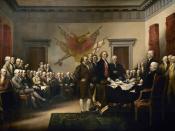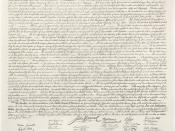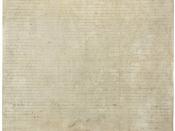In the two decades prior to the Revolution, the Americans built up a series of grievances against the British government. Those complaints were clearly articulated in the Declaration of Independence. The colonists did this to prove to every other country in the worlds that their reason for war was justified. It is also important to keep in mind that when Thomas Jefferson wrote this, he did not mean for it to be a historical text, he wrote it as a persuasive essay to gain support from other European countries. So the fact that some of the grievances listed may be fabricated or altercated, is only natural if you want to gain allies, and make your parent country look bad. The colonists didn't want to quietly separate form the British; they wanted to make a statement. Although some of the charges leveled against the king in the Declaration aren't valid, the majority of the charges, including those about trade, economics, political influence, and domestic feuding, were very much valid charges.
The grievance in the Declaration of independence that specifically addresses the commerce problem within the colonies states that Britain "cut off all trade with other parts of the world," except them. We can clearly see this statement is a valid grievance, because if we examine the numerical statistics of imports and exports of Britain in the years of 1763-1775, we can clearly see a disturbing pattern. In Britain's trade with the colonies the colonists received about ü of what they exported, back in imports (Document B). This unbalance is a big gap that identifies the underlying issue of monopolization, which the British had over the colonies. The Colonists couldn't possibly have traded with any other country anyways because they had no money. The Grievance in the Declaration of independence that addresses...


